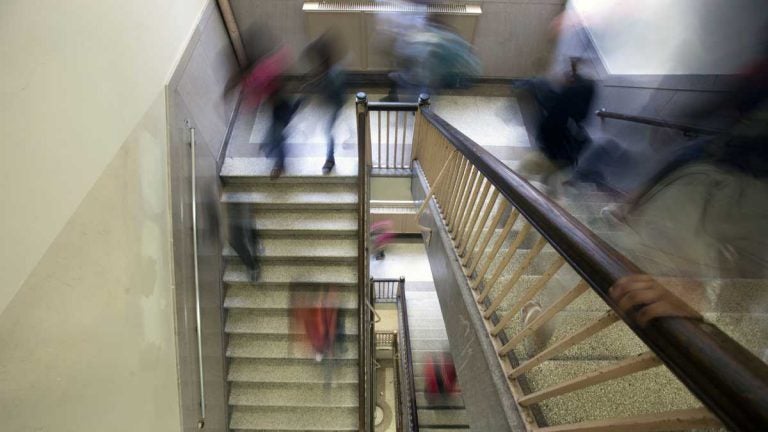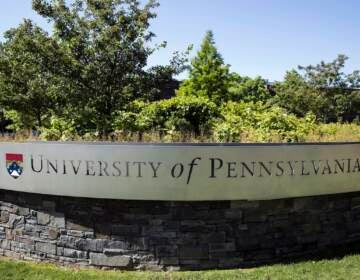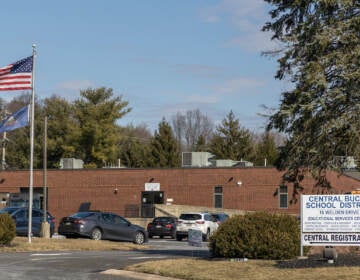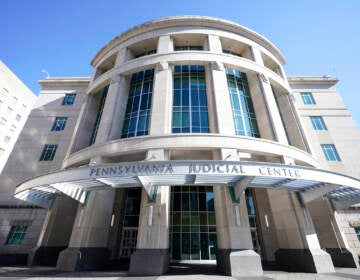A ‘catastrophic failure’ or ‘above the constitutional threshold’? Pa.’s school funding trial comes to a close
After seven years of waiting and months of oral arguments, the first phase of this historic trial ended Thursday.

Students change classes at a public school in Pennsylvania. (Jessica Kourkounis for Keystone Crossroads)
After a seven-year journey to Commonwealth Court and months of testimony, the case against Pennsylvania’s system for funding education could be summed up in one sentence: “Low-wealth districts do not have the resources they need to prepare all children for college, career, and civic success.”
That’s the argument petitioner attorney Katrina Robson put forward on the last day of the trial.
Petitioners in the case — which include six school districts, several parents, and two statewide organizations — are asking the court to find that the state’s current funding system is inadequate, inequitable, and illegal. They say Pennsylvania is not meeting its constitutional mandate to provide a “thorough and efficient” education, and that funding disparities among districts are so wide the state is violating its own equal protection clause.
”But defense attorneys for GOP legislative leaders say Pennsylvania’s public schools “pass constitutional muster,” that the state has taken steps to distribute funding more equitably — through a student-weighted funding formula — and that pouring more money into the system won’t necessarily lead to better student outcomes.
Judge Renée Cohn Jubelirer will decide whose argument holds more weight, though a ruling is months away. The losing side is expected to appeal, kicking the decision up to the State Supreme Court.
As she began her closing argument on Thursday, Robson circled back to the first day of the trial, when defense attorneys representing GOP legislative leaders claimed that the “constitutional mandate is being exceeded” in school districts across the Commonwealth.
“Those words ring hollow after three months of testimony from superintendents, teachers, and a very brave student about the actual learning conditions in lower wealth districts,” Robson argued.
That testimony included stories of children forced to learn in hallways and closets due to overcrowding, and buildings “riddled” with mildew or asbestos or forced to close “because there weren’t sufficient funds to remediate unsafe conditions,” she said.
It included examples of schools without enough, or any, math and reading interventionists to help close learning gaps, and “report after report showing that students in those under-resourced districts are not able to meet state academic standards,” Robson said.
Testimony throughout the trial has been “overwhelmingly consistent” on a few key points, Robson said: that every student can learn; that some students require more resources to learn than others; and that lower wealth school districts serve a greater share of students that need more resources.
Yet in Pennsylvania, she said, the districts that need the most receive the least, partly because the state relies more heavily than most on local taxes to fund schools.
“The very poorest districts are left with both high tax burdens and substantial funding shortfalls,” Robson said, leading to some of the widest spending gaps between poor and wealthy districts in the nation.
“A system that strands children capable of learning in districts that lack the resources necessary to teach them cannot be considered thorough and efficient,” Robson argued. “A system in which hundreds of thousands of students fail to meet state standards in math, English language arts and science cannot be considered adequate.”
Do Pa. schools “pass constitutional muster”?
Defense attorneys pushed back against Robson’s dire portrait of the petitioner districts — while also stressing that the question in front of the court is whether the state’s education system is meeting the “minimum requirements of the constitution.”
“Every one of the districts suing in this case is well above the constitutional threshold,” said Thomas DeCesar, a lawyer representing Senate President Pro Tempore Jake Corman.
The case is not about whether the court, petitioners or respondents would “prefer to change something about Pennsylvania’s system of education,” DeCesar said, but about “whether the system of education in Pennsylvania is, as the petitioners claim, a system that is deficient, and one which is so deficient that it is unconstitutional.”
“Of course there are things about public education in Pennsylvania that we would like to do better,” said Patrick Northen, an attorney for House Speaker Bryan Cutler. “But the question before this court is not how to construct an ideal system of public education, no matter how much it might cost” but “whether petitioners have met their burden” of proving that the system violates the constitution.
Both lawyers said that Pennsylvania schools are providing students with the education basics and more.
“Every petitioner district is providing its students with instruction in core subject matter areas including math, English, science, social studies, health, phys ed, foreign language and technology,” DeCesar said. The districts provide math, music, and drama instruction and remedial supports; they have special education and English language programs.
These districts were “handpicked because, in the petitioners’ view, they are the best representations of what they believe is wrong with the system,” DeCesar said, and yet in his view they all “pass constitutional muster by a wide margin.”
They also pushed back against using measures like statewide standardized tests to determine the quality of students’ education. Northen argued that achievement gaps can be linked to factors outside of school control.
“Unsatisfactory test scores and other outcomes in some school districts [are] not the result of constitutionally underfunding public schools, but of the larger societal, community, and personal factors, including the well-documented impact of poverty on cognitive development and academic performance,” he said.
Petitioners have cited the impact on poverty on student learning as one of the reasons lower wealth districts need additional resources, but Northen argued that schools are not constitutionally required to address “all barriers to education that are caused by poverty or personal or family circumstances.”
Serving the needs of the Commonwealth
In his closing argument, DeCesar emphasized that the education clause in the state constitution calls for a system of education that is not only “thorough and efficient,” but “serves the needs of the Commonwealth.”
“Education is not the only need of the Commonwealth,” he said. “The General Assembly has more duties” — and financial responsibilities — “than just creating a system of public education.”
DeCesar also stated that one of the Commonwealth’s needs is “a wide range of people ready and willing to do a wide range of work,” advancing one of the more controversial arguments in the case.
Earlier in the trial, another one of Corman’s attorneys questioned the state’s academic standards, asking why students on the “McDonald’s career track” would need to learn algebra, and stating that the Commonwealth has a need for “people who know how to flip pizza crust.”
Petitioner attorney Katrina Robson addressed the moment in her closing argument.
“According to the legislative respondents, a system of education that leaves those children incompetent on core standards is still serving the needs of the commonwealth and therefore rational,” she said, adding that the the suggestion “makes a mockery of the education clause” in the state constitution, which was meant to ensure that there would not be a “two-tiered system of education in the Commonwealth.”
But DeCesar doubled down on the argument during his closing statement.
“Simply put, Pennsylvania has a lot of different needs, and graduating with a liberal arts degree from a four-year university is not the right choice for everyone,” he said, criticizing the petitioners’ focus on college graduation rates as a measure of student achievement.
“We have a need for citizens to go into the trades and different industries,” DeCesar said. “We have a need for plumbers, police officers, electricians and IT professionals. We have a need for retail workers, truck drivers and those in the hospitality industry, just as we have a need for teachers, nurses and computer engineers.”
‘It was a systems failure’
The defendants also questioned whether more money would improve student outcomes, and whether districts are spending money wisely.
“In this case, no one has analyzed how money is being spent by Pennsylvania school districts,” DeCesar said, arguing that petitioner districts “are not using their funding in a way that maximizes efficiency.”
The School District of Lancaster, for example, bought iPads for its students rather than less expensive Chromebooks. Greater Johnstown recently spent $400,000 on new lights for its football stadium, and Panther Valley used federal pandemic relief funds to, among other things, add new high school classes including broadcast journalism and “Monsters and Literature.”
“There is no requirement in the Pennsylvania constitution that school districts provide opportunities in broadcast journalism,” DeCesar said.
Earlier in the trial, defense attorneys had pointed to course offerings like “Monsters and Literature” as evidence that districts were providing students with a wide range of learning opportunities, something Robson took issue with during her closing argument.
“The catastrophic failures of this system are not because children look at course guides and aren’t smart enough or industrious enough to seize opportunities,” she said. “The failures are because they were denied those opportunities to begin with, from the very moment they had their needs triaged as if they were walking into a field hospital instead of a kindergarten. It was a systems failure, not theirs.”
She also took issue with the defense’s argument early in the trial, that one cause for those catastrophic failures is “innate differences in children — that some children have more natural intelligence or a better work ethic, and that some children are more industrious or better equipped to take advantage of the opportunities that are offered.”
Robson spelled out some of the dire statistics for children of color and low-income students throughout the state — who, petitioners argued, are disproportionately affected by funding gaps.
In any given year, she said, 75% of Latino children will fail to reach proficiency in math, and 80% of low-income Black and Latino graduates will fail to earn a college degree. The number of Black students taking the AP Computer Science exam could fit into the courtroom, she said, referring back to testimony that just 58 Black students in the entire commonwealth took the test back in 2015.
Black, Latino, and low-income children have the same natural intelligence and work ethic as their peers, Robson said; the problem isn’t that they aren’t smart or industrious enough to seize opportunities, it’s that they don’t have access to those opportunities.
“Suggesting that this disaster is because children ignore opportunities allows us to place the blame for failure at their feet rather than the General Assembly’s, all to constitutionally bless a system where wide swaths of students are failing to achieve and where particular groups of historically underserved students bear the brunt of it,” Robson said.
‘Many things can be true at once’
Gov. Tom Wolf is also a defendant in the case, but has largely taken a backseat during the trial and has not challenged petitioners’ claims.
Wolf, who inherited the lawsuit when he took office in 2015, has been a strong proponent of increased school funding. His most recent budget proposal calls for a record investment in education.
Sophia Lee, an attorney representing Wolf, said the testimony from petitioners’ witnesses “as to the conditions of the schools and the quality of educational experiences is credible and should be credited by the court.”
Those school conditions are why the Wolf administration has worked hard to pursue the General Assembly to both provide more funding for schools, and distribute that money more equitably, Lee said, adding that the case is about “how many things can be true at once.”
It is true that, in the time since the lawsuit was filed, “significant progress has been made,” she said. “It is also unfortunately true that our schools are underfunded, that the quality of public education is determined by zip code, and that while the historic investments in education have been increasing, those investments are not all equitably allocated, nor are they translating into a bigger pie for instructional dollars.”
The historic investments are needed to offset the historic education cuts made before Wolf took office, along with rising pension costs and inflation, she said.
“What the court must determine is whether all the significant accomplishments, when accompanied by the unfortunate truths, are sufficient to meet the constitutional standard,” Lee said.
 WHYY is one of over 20 news organizations producing Broke in Philly, a collaborative reporting project on solutions to poverty and the city’s push towards economic justice. Follow us at @BrokeInPhilly.
WHYY is one of over 20 news organizations producing Broke in Philly, a collaborative reporting project on solutions to poverty and the city’s push towards economic justice. Follow us at @BrokeInPhilly. WHYY is your source for fact-based, in-depth journalism and information. As a nonprofit organization, we rely on financial support from readers like you. Please give today.








